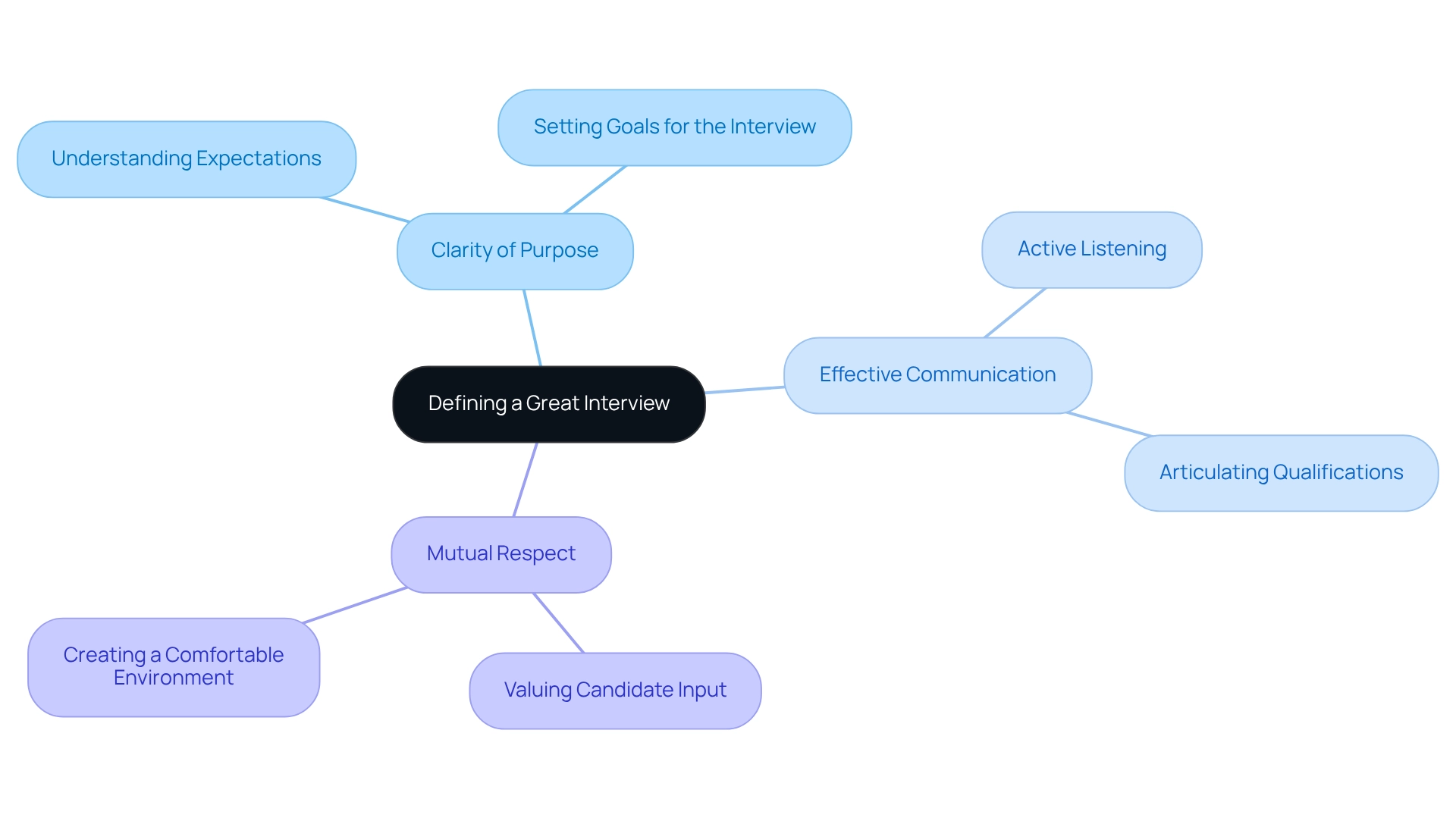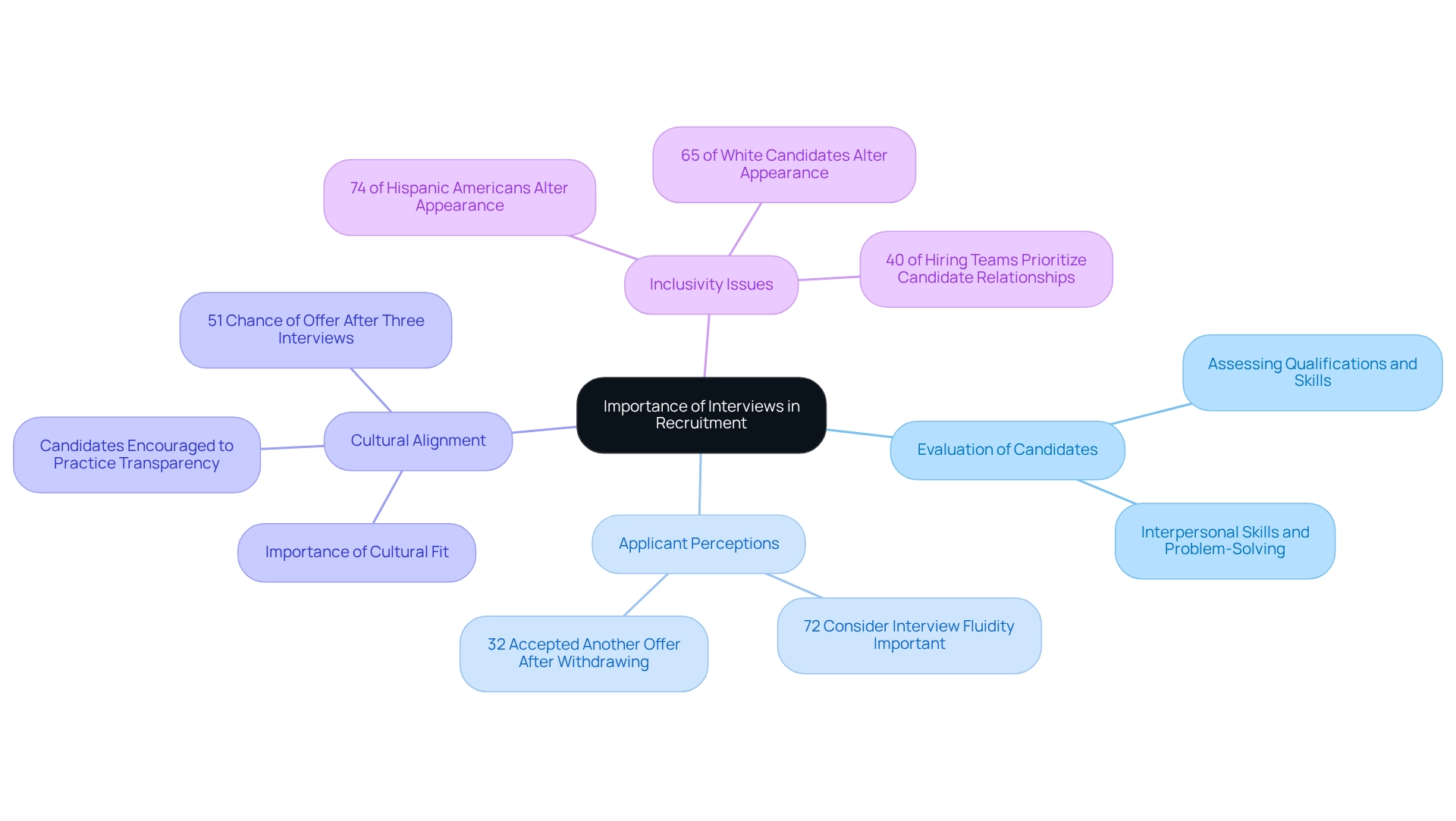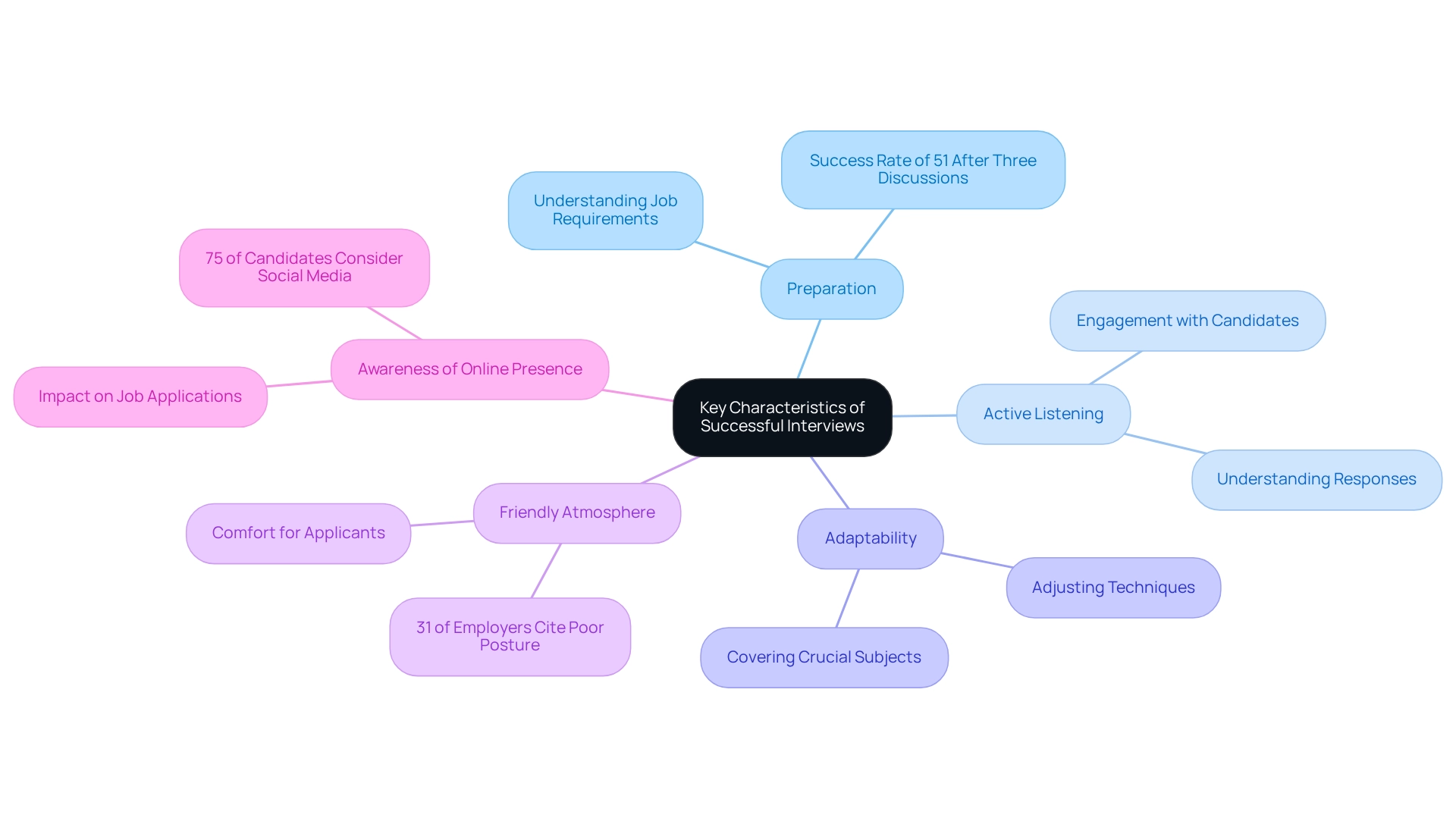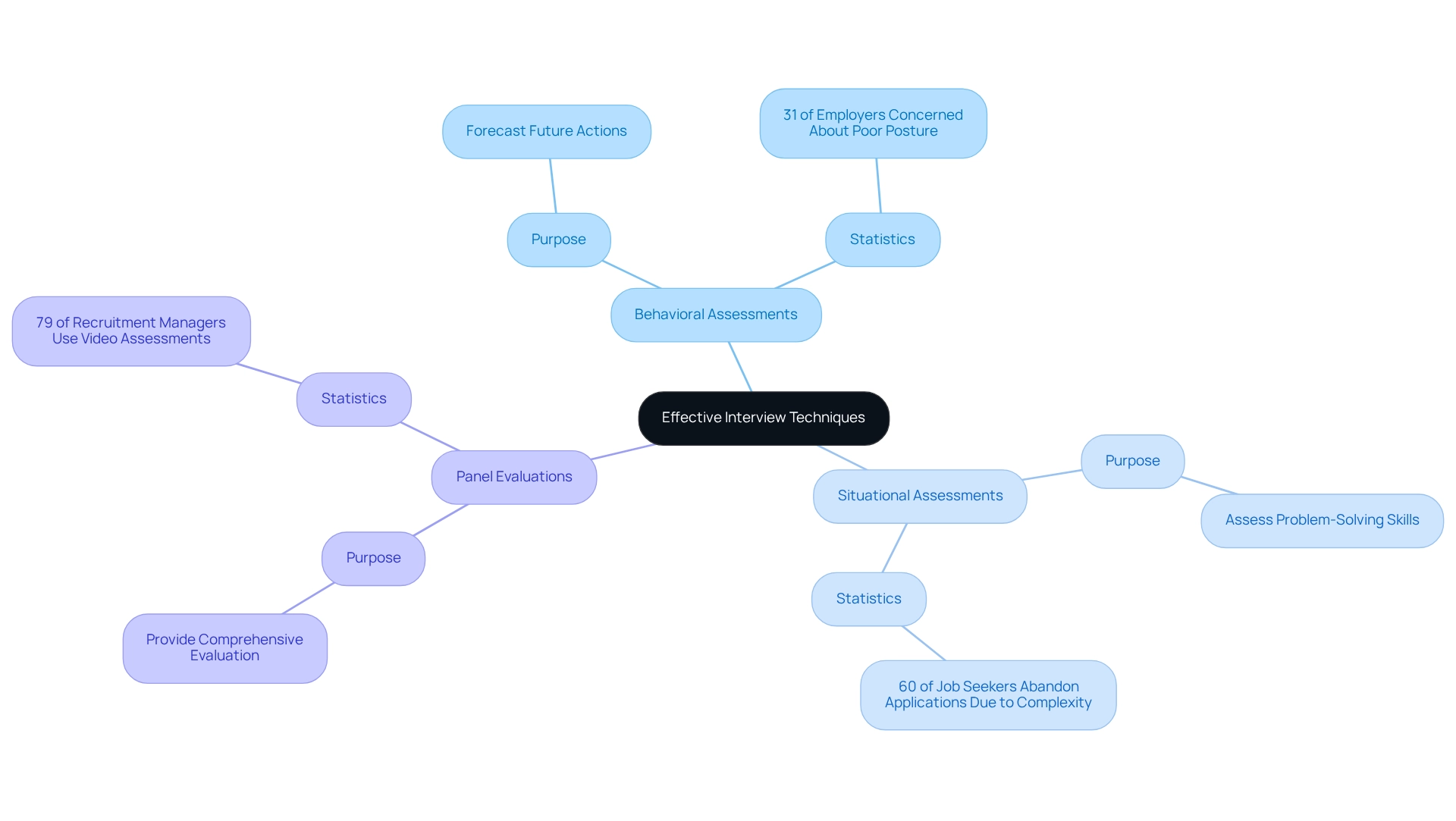Overview
A great interview is characterized by structured conversations that assess candidate fit while allowing mutual evaluation between the candidate and the organization. This process emphasizes clarity, effective communication, and mutual respect. The article supports this by detailing the importance of active listening, cultural alignment, and a friendly atmosphere. Collectively, these elements enhance the interview experience and lead to better recruitment outcomes.
Have you considered how structured interviews can transform your hiring process? In the competitive landscape of recruitment, especially in the financial sector, understanding the nuances of candidate evaluation is paramount. Active listening and cultural alignment are not just buzzwords; they are essential components that can significantly influence hiring decisions.
Imagine the benefits of personalized recruitment services tailored specifically to the financial industry. Such services not only streamline the hiring process but also ensure that candidates align with your organization’s values and culture. This alignment fosters a more cohesive work environment and enhances employee retention rates.
Client testimonials reinforce this notion, showcasing how tailored recruitment strategies have led to successful hires and satisfied teams. When organizations prioritize structured interviews, they position themselves as leaders in the recruitment field, attracting top talent and fostering a positive workplace culture.
Therefore, if you are ready to elevate your recruitment strategy, consider implementing structured interviews that facilitate mutual evaluation. Reach out for a consultation today and discover how our expertise can help you navigate the complexities of hiring in the financial sector.
Key Highlights:
- A great interview is a structured conversation that evaluates candidate fit while allowing mutual assessment of the organization.
- Key principles of successful interviews include clarity of purpose, effective communication, and mutual respect.
- Active listening is crucial for interviewers to understand candidates’ qualifications and aspirations.
- Cultural alignment is vital; employers should prioritize it to select candidates who thrive in their organizational environment.
- Statistics show that 72% of applicants consider the interview process’s fluidity critical in their decision-making.
- Candidates benefit from transparency regarding their workstyle preferences and salary expectations during interviews.
- Establishing a friendly atmosphere helps applicants feel comfortable and promotes genuine dialogue.
- Effective interview techniques include behavioral and situational assessments, enhancing candidate evaluation.
- Using structured methods like the STAR approach can improve clarity and efficiency in candidate responses.
- Employers should be mindful of non-verbal cues, as 31% consider poor posture a concerning factor during assessments.
Introduction
In the realm of recruitment, interviews serve as a crucial gateway, bridging the gap between potential candidates and their future employers. As organizations strive to attract top talent, understanding the dynamics of effective interviews becomes essential.
This article delves into the core principles that define a successful interview, emphasizing the importance of structured conversations that foster clarity, respect, and engagement.
How can organizations ensure they are not just evaluating qualifications, but also assessing cultural fit? This exploration highlights the significance of a positive interview experience in today’s competitive job market.
By examining key characteristics of successful interviews and a variety of effective techniques, this piece offers valuable insights for both employers and candidates. Ultimately, it aims to enhance the recruitment process and secure the best talent.
Defining a Great Interview: Core Principles
A structured conversation aimed at evaluating a candidate’s fit for a specific role, while allowing the candidate to assess the organization, is what makes a great interview. The essential principles of a successful discussion encompass:
- Clarity of purpose
- Effective communication
- Mutual respect
This structured approach transforms the interview into a two-way dialogue, enabling both parties to articulate their expectations and concerns. Such an environment not only aids in identifying the right individual but also enhances their experience, fostering a sense of value and respect throughout the process.
In today’s competitive talent landscape, clarity in communication is paramount. As Winston Churchill aptly noted, “Courage is what it takes to stand up and speak. It also requires bravery to take the time to sit and listen.” This underscores the necessity for interviewers to actively listen and engage with applicants, ensuring a comprehensive understanding of their qualifications and aspirations.
Case studies illustrate the effectiveness of organized discussions, showcasing how Boutique Recruiting’s commitment to quality and tailored service has yielded numerous satisfied clients and applicants. Clients have commended Boutique Recruiting for their ability to swiftly present highly qualified individuals and for their profound understanding of specific roles and company cultures. By adhering to these fundamental principles, organizations, particularly in the financial sector, can cultivate what makes a great interview process, ultimately leading to enhanced recruitment outcomes. This method not only enriches the applicant experience but also aligns with the industry’s demand for accuracy in recruitment, ensuring that the suitable talent is matched with the appropriate roles.
The Importance of Interviews in Recruitment
Understanding what makes a great interview is crucial, as interviews serve as a pivotal component of the recruitment system, enabling employers to evaluate not only applicants’ qualifications and skills but also their compatibility with the organization’s culture. This interaction allows for the assessment of interpersonal skills, problem-solving capabilities, and overall demeanor—attributes essential for fostering effective team dynamics. Furthermore, these discussions provide applicants with insights into the company culture and job expectations, facilitating more informed decision-making.
In today’s competitive employment landscape, the effectiveness of interviews can significantly influence an applicant’s decision to accept an offer. Notably, statistics reveal that 72% of applicants consider the fluidity of the interview process a critical factor in their ultimate choice. Additionally, 32% of North American applicants who exited the recruitment process reported accepting another offer from a different firm, underscoring the competitive nature of the job market and the importance of a seamless selection experience. Moreover, 40% of recruitment teams emphasize the need to establish stronger connections with candidates throughout the selection process, highlighting the significance of a positive experience during evaluations.
Cultural alignment is increasingly recognized as a vital aspect of the selection process. Employers who prioritize this element during interviews are more likely to select candidates who not only meet technical requirements but also thrive within the organizational environment. Candidates are encouraged to practice transparency by openly discussing their workstyle preferences, salary expectations, and any unique personal circumstances. Such honesty cultivates trust and enables hiring managers to assess suitability effectively. Case studies indicate that the likelihood of receiving a job offer increases significantly with multiple interviews, with chances rising to 51% after three sessions. This underscores the necessity for candidates to prepare for several rounds, thereby enhancing their prospects of securing a position.
Moreover, it is essential to acknowledge the pressures individuals face during interviews; for instance, 74% of Hispanic Americans feel compelled to alter their appearance before job assessments, in contrast to 65% of white applicants. This highlights the importance of fostering an inclusive and understanding environment during discussions. Ultimately, interviews serve as a crucial mechanism for evaluating candidates and ensuring they are well-suited for the roles they pursue, highlighting what makes a great interview indispensable in the quest for top talent.
Key Characteristics of Successful Interviews
Several key characteristics define what makes a great interview, including preparation, active listening, and adaptability. Preparation is essential; it entails a comprehensive grasp of the job requirements and the applicant’s background, allowing interviewers to develop pertinent questions that provoke significant responses. Active listening plays a crucial role in this process, fostering engagement and ensuring that interviewers fully understand applicants’ responses. Moreover, adaptability enables interviewers to adjust their technique according to the conversation’s progression, guaranteeing that all crucial subjects are covered.
Establishing a friendly atmosphere is also significant, as it assists applicants in feeling comfortable, resulting in more genuine and insightful dialogues. This is especially important given that 31 percent of employers mention poor posture as a worrying aspect in applicant assessment, highlighting the necessity for individuals to feel at ease during evaluations. Furthermore, the significance of readiness is emphasized by the finding that success rates rise considerably through numerous discussions, with the chances of obtaining an offer climbing to 51 percent after three discussions, according to industry studies. Additionally, Boutique Recruiting’s dedication to inclusivity is demonstrated by the fact that 81% of employers provide adjustments for individuals with disabilities. This commitment not only improves the interview experience for diverse applicants but also enriches the overall recruitment process by ensuring that all individuals have an equal opportunity to demonstrate their skills.
Insights from the case study on diversity and discrimination in recruitment highlight the ongoing challenges faced by underrepresented groups, emphasizing the need for interviewers to be mindful of diverse backgrounds and experiences. Furthermore, with 75% of candidates considering a company’s social media presence when deciding whether to apply for a job, interviewers should also be aware of how their organization is perceived online. By concentrating on these traits, interviewers can better understand what makes a great interview, ultimately resulting in superior recruitment outcomes.
Examples and Variations of Effective Interview Techniques
Effective techniques for selection encompass a range of methods, including behavioral assessments, situational assessments, and panel evaluations, each serving distinct purposes in the recruitment process. Did you know that 79% of recruitment managers are now employing video assessments to enhance accessibility and efficiency? Behavioral assessments concentrate on applicants’ past experiences to forecast future actions, while situational evaluations introduce hypothetical situations to assess problem-solving skills. Panel discussions, involving several evaluators, provide a thorough viewpoint on an applicant’s appropriateness for positions like CFO, Financial Manager, and Director of Finance. This shift reflects a broader trend towards flexible recruitment practices, allowing organizations to connect with applicants more effectively. Given the ongoing competition for talent, it is essential for recruitment managers to ensure that the assessment experience is smooth, as leading candidates are not merely searching for any position but the ideal match with the appropriate organization.
To enhance the efficiency of these techniques, utilizing structured methods like the STAR approach (Situation, Task, Action, Result) can greatly assist candidates in expressing their experiences. This clarity not only aids in better assessments by evaluators but also corresponds with findings that 72% of candidates believe assessment efficiency affects their job acceptance choices. Additionally, the significance of efficiency in the selection process is emphasized by the fact that 60% of job seekers abandon online applications because of length or complexity, underscoring the necessity for a streamlined method throughout the hiring experience.
Furthermore, grasping the distinctions between behavioral and situational assessments is essential. Studies show that 31% of employers view poor posture as a worrying element during assessments, highlighting the importance of non-verbal signals in discussions. Interviewers should be aware that these cues can greatly influence their overall evaluation of applicants. As organizations enhance their selection strategies, they must consider these factors to ensure a comprehensive assessment process. Furthermore, it is essential to acknowledge that live technical tests carried out during assessments can reduce applicant performance by 50%. This statistic suggests that while technical assessments can be valuable, understanding what makes a great interview requires that they be carefully integrated into the interview process to avoid negatively impacting candidate performance. Ultimately, tailoring interview techniques to the specific needs of the organization and the role can lead to more successful hiring outcomes, particularly in high-demand finance and technology sectors, as evidenced by the growing reliance on diverse interviewing methods in today’s competitive job market.
Conclusion
A successful interview process is crucial for organizations seeking to attract and retain top talent. By focusing on key principles such as clarity, effective communication, and mutual respect, employers can transform interviews into valuable dialogues that benefit both parties. This approach not only facilitates a comprehensive evaluation of qualifications but also enhances the overall candidate experience.
Cultural fit is a vital consideration in hiring. Candidates who align with an organization’s values are more likely to succeed. Employers should actively assess this aspect during interviews and create an inclusive environment that acknowledges diverse backgrounds. This fosters trust and improves the candidate journey.
Employers can also benefit from employing effective interview techniques, such as behavioral and situational interviews, to gain deeper insights into candidates’ skills. The integration of technology, particularly video interviews, has made the recruitment process more efficient and accessible. This allows organizations to connect with a broader talent pool.
In conclusion, a well-executed interview process is about more than just filling vacancies; it establishes a foundation for a successful workplace. By prioritizing effective communication, cultural alignment, and inclusivity, organizations can attract the right candidates and enhance their reputation in the competitive job market. Embracing these principles will be essential for securing the best talent in the future. Are you ready to elevate your recruitment strategy and ensure a successful hiring process?
Frequently Asked Questions
What is the purpose of a great interview?
A great interview is a structured conversation aimed at evaluating a candidate’s fit for a specific role while allowing the candidate to assess the organization.
What are the essential principles of a successful interview?
The essential principles of a successful interview include clarity of purpose, effective communication, and mutual respect.
How does a structured approach benefit the interview process?
A structured approach transforms the interview into a two-way dialogue, enabling both parties to articulate their expectations and concerns, which enhances the overall experience and fosters a sense of value and respect.
Why is clarity in communication important during interviews?
Clarity in communication is crucial in today’s competitive talent landscape as it ensures that interviewers actively listen and engage with applicants, leading to a comprehensive understanding of their qualifications and aspirations.
What role do case studies play in understanding effective interviews?
Case studies illustrate the effectiveness of organized discussions and showcase how companies like Boutique Recruiting have successfully matched qualified individuals with specific roles and company cultures.
How can organizations improve their interview processes?
Organizations can improve their interview processes by adhering to fundamental principles such as clarity, effective communication, and mutual respect, ultimately leading to enhanced recruitment outcomes.
What impact does a great interview have on the applicant experience?
A great interview enriches the applicant experience by creating an environment of respect and value, which aligns with the industry’s demand for accuracy in recruitment.






